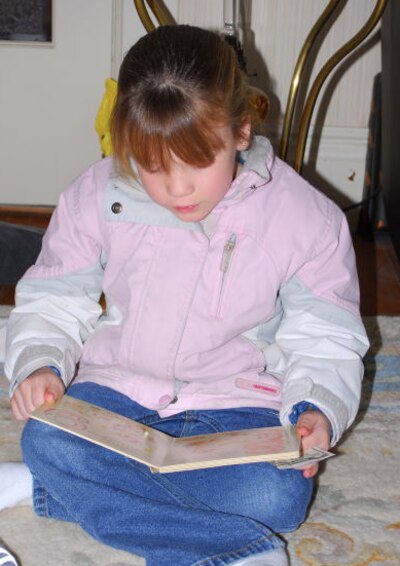Q. My child likes to read alone, rather than aloud together as we used to. I am concerned that she is not fully comprehending the book she is reading.
A. My daughter is reaching the same stage as yours! Here are some things I do with my daughter. When she reads alone, I ask her to tell me about the chapter or section she has read when she is finished. I ask her questions about

the characters and setting. I ask her to tell me about the important events and to make a prediction about what might happen in the next chapter.When she is able to give a lot of specifics and details as she tells me about her reading, I feel pretty confident that she is comprehending the story. When I am not sure if she quite understands, I will read through the pages she has read to see if she is missing any key elements. Here are some other things to keep in mind with this strategy.Suggestions to help your young reader grasp meaning
- Make sure she is reading books at her independent reading level (ask her teacher if you are not sure what books might be at her independent level).
- Provide a quiet environment, free from distractions for reading.
- Pick up a book and enjoy some reading time yourself! It is so important for kids to see adults reading for enjoyment.
One thing to keep in mind is that children will also be evaluated on their reading fluency in school. So, it is important to practice reading fluently out loud from time to time. One idea is to have your daughter read a page or a few paragraphs to you from the book. I will sometimes ask my daughter to read her favorite part out loud to me. I think she likes the idea that she gets to choose which part to read. Also, if she knows that I am going to ask her to read out loud, I notice that she pays more attention.
You can also make a deal with your daughter that she can read the first page out loud and as long as she does well, she can read the rest of the chapter to herself. For fluency, you are listening for your child to sound like she is talking as she reads. She should pause at commas and periods. She should read in meaningful phrases. And, she should be able to read most of the words quickly and easily.
Remember that children of all ages enjoy listening to stories. So, continue to read to your daughter. You can read chapter books that would be too difficult for her to read independently. You can read books she might not normally choose to read such as non-fiction books. I hope you enjoy this next stage of reading with your daughter.
About our First Person series:
First Person is where Chalkbeat features personal essays by educators, students, parents, and others trying to improve public education. Read our submission guidelines here.
